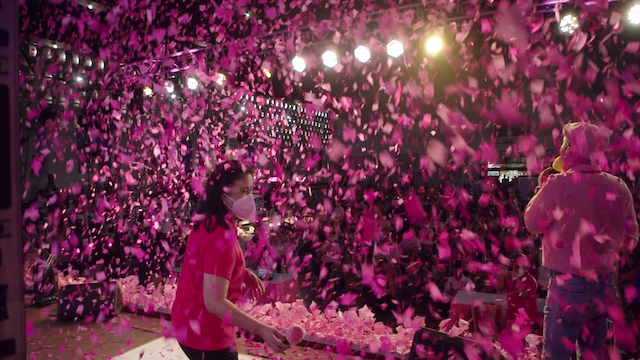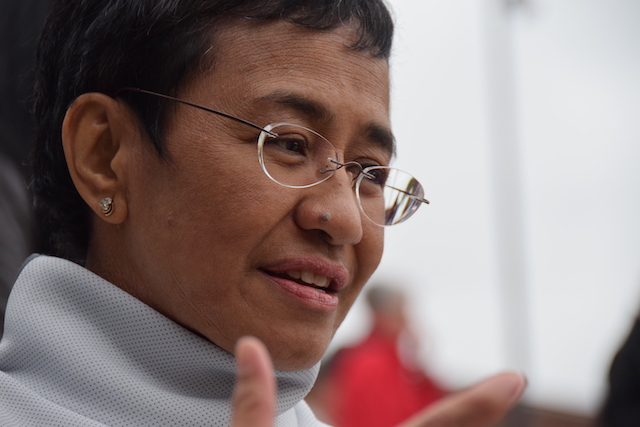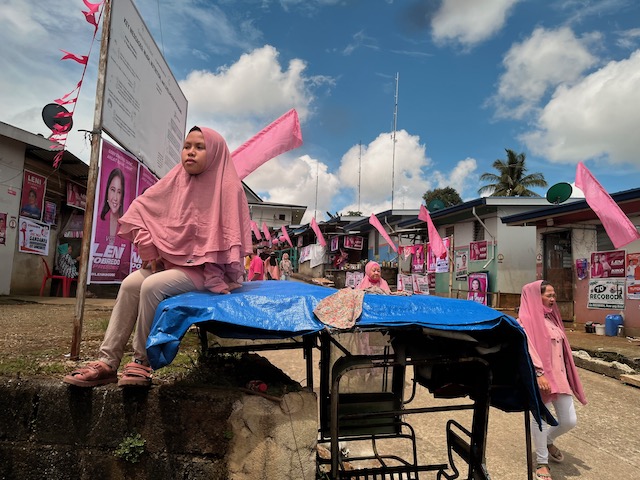
©Cinediaz
And So It Begins : Amidst the traditional pomp and circumstance of Filipino elections, a quirky people’s movement rises to defend the nation against deepening threats to truth and democracy. In a collective act of joy as a form of resistance, hope flickers against the backdrop of increasing autocracy.
With the end of Rodrigo Duterte’s presidency and his attacks on democratic institutions like a free independent press, some Filipinos hoped for a new beginning. In contrast, others yearned for even more autocracy and a return to an era before the People Power Revolution and the restoration of democracy just a generation before.
In this companion piece to A Thousand Cuts, which helped introduce the world to online news site Rappler and Nobel Peace Prize winner Maria Ressa, director Ramona S. Diaz returns to Sundance with a film that takes you inside the fight for democracy in the modern media age. As elections threaten to be simulacrums of democratic processes, And So It Begins chronicles what the defenders of democracy in the Philippines have experienced and is a haunting depiction of what is at stake in elections around the world.

Exclusive interview with Director Ramon S. Diaz, former Vice President of the Philippines, Leni Robredo, and Nobel Peace Prize winner Maria Ressa.
Q: Ramona, you’ve made documentaries previously such as “Imelda,” “Don’t Stop Believin’: Everyman’s Journey” and “Motherland.” They mostly focus on a particular person but are also a depiction of the state of The Philippines — your mother country. How did you decide to tackle the Philippine election this time around?
Ramona S. Diaz: This film, “And So It Begins,” was imagined or hatched as a companion film to “A Thousand Cuts.” In the beginning, it was supposed to be just an hour-long television program, a follow up to what was happening with [embattled journalist] Maria Ressa. But when I went back to the Philippines in 2021, the country was still in complete lockdown. Coming in, I had to quarantine for 14 days. I wasn’t even sure we were going to be able to film anything because everyone was still separated from each other.
What was imminent was an election and no one knew what the election was going to look like because elections in the Philippines are spectacular and everyone gets together. With social distancing, we didn’t know if the election was going to happen on Zoom. I didn’t want a movie on Zoom. But I went back to the Philippines. and of course, picked up where we left off with Maria. As to what was happening with her, she really concerned about the coming elections and the disinformation. Then of course, there was the possibility of Leni running against the dictator’s son. It was very apparent it was going to happen. That to me was the story.
I had to include that story and show in real time. Maria’s concern was about this information coming to fruition. So that’s how it happened. It was set against a backdrop of of the elections and was really important that it was still very much about disinformation. It’s still very much about historical revisionism, collective amnesia and romanticizing a past that never happened. It’s about memory — how people choose to remember a traumatic past.
Q: Speaking about the romantic past, there was hope when Ninoy Aquino emerged against the dictatorship of Ferdinand Marcos, but that hope was lost and tarnished by his assassination. What was it like in the Philippines when Ninoy Aquino was assassinated?
Leni Robredo: For me, it was a tipping point. I said that in one of the interviews shown in the movie. I was in college at that time, I was very apolitical and not joining any organizations. There was a lot of pent-up resistance already about the government because this was at the height of the Marcos dictatorship. I was one of the many young people who were still apolitical, but the tipping point for me was the assassination of Ninoy Aquino. That assassination was the one single event which opened the floodgates of resistance in the Philippines. It was a very important tipping point in the sense that there was so much fear of going out in the open to campaign against the dictatorship. That assassination was the tipping point for many people like me.
Ramona S. Diaz: I’ve told the assassination story twice already, but it was never through the lens of Ninoy Aquino. I told it in the Imelda story from the point of view of Imelda. And now I tell it through the point of view of Leni. In this film, we talk about her political awakening. It also serves to tell the story of the past. It just occurred to me that I’ve already tackled that assassination, but not from the point of view of the Aquinos or from Ninoy himself.
Maria Ressa: My view of it was, we’re back to the future, this is history so we look back at it, but we’re living it again in a different time through Leni’s eyes. I think with the technology, I was saying this everything will move quicker, from the assassination of Ninoy Aquino to 1986 people power took three years. Now big tech has shifted everything, everything is exponentially faster. The rise of Marcos without big tech would not have happened. Maybe it would have been 20 years from now if you follow the path of people wanting a nostalgia for the past, because democracy is so hard, this nostalgia for someone … the dictator to tell you how to do it.
There is that, I saw that happen in Indonesia. I saw it in the Philippines, but it’s slow. This happened because of that. To see it through Leni’s eyes, I’m going to talk about her in the third person. She’s a reluctant woman who was thrust forward by her people … by history I think that is what is interesting in the film. The fact that women were in the forefront … after the assassination of her husband Cory Aquino had stepped up then and by 1986 many of the business women who had jumped in finally tipped it. Yeah. Back to the future. I want to know how this will play out. Can it happen like in front of our eyes now?
Q: Maria, talk about the news organization that you established, Rappler? What types of news are you and your team focusing on?
Maria Ressa: Rappler was born in 2012. The idea we started with a very small group, 12 people. We’re roughly about 100-120 people now, if you would bring everyone in. The Duterte years, and you saw this in “A Thousand Cuts” was extremely challenging because we’re not corporate media. we did the right thing. We lived the mission of journalism and the consequences were very clear. I felt what was at stake, not just for the Philippines, but also for the World. It was very clear and we weren’t going to be the first to open the floodgates.
I think those themes are here again and frankly, for the American audience watching, you’re playing it out, what Leni and Filipinos lived through in our May 2022 votes. You’re going to go through it in November this year. I think this film shows you there is life after regardless of who wins, but that what is at stake is just so incredibly much. Since 2016, we had always said (and I first said this in Silicon Valley) that what is happening in the Philippines is coming for you on January 6th, 2021. It did come for you.
It became more violent than what had even happened in the Philippines, right? Then for us, we have a Marcos junior as president today, the level of fear has lifted slightly. This president cares about the international community. I’m able to travel. 8 of the 10 cases against me – I’ve been acquitted of these charges. Having said that it’s far from perfect. When the data began, I just kept saying 2024 is going to be a critical year for news organizations because we will struggle to survive this year. And for democracy, this is the tipping point for democracy. Ramona says she’s optimistic about this and I think the optimism grows out of knowing that, regardless of what happens, we need to keep up with our values, democracy demands.

©Cinediaz, Maria Ressa
Q: Leni, you and your husband, Jesse Roberto, have a reputation for exposing corruption and injustice and solving the poverty issues. When you became the vice president in 2016, what was the toughest challenge that you faced then? What motivates you to continue with politics?
Leni Robredo: The number one challenge for me was being marginalized by the president. I always say that the Philippines is very different from any other country in the sense that the vice president is elected separately from the president. It happens sometimes that the president and the vice president come from different political parties. But even if that was the case in the past, the president and vice president would always have very civil relations.
Our constitution allows the president to appoint the vice president to a cabinet post. The only mandate of the vice president under our constitution is succession making the vice presidency more relevant. If the president appoints the vice president to a cabinet post, then she becomes officially part of the administration. But in my case, that didn’t happen. Even before we started our term, the president had already made it clear that I would have no place in his administration. I tried to maximize my influence even though I was only allowed limited political power.
Even though I was marginalized, we started an anti poverty program that has become very big. It’s now a nonprofit, and it made the office of vice president more relevant in the six years that I was there. We were not relegated to just doing ceremonial work. Maria and Ramona know what motivated me, I wasn’t keen on seeking the presidency because of all the attacks hurled against me; I knew that I had a very slim chance.
I was not feasible as a candidate at all so in the months before the filing of the certificates of candidacy, I exerted a lot of effort in putting up a united opposition ticket and was unsuccessful. I decided to run the last minute because I knew that there had to be an alternative. When I decided to run, I was very much prepared for it to be a very sad campaign. My numbers were down and going into the campaign, I only had a 7% approval rating. I think number six or seven in the surveys. After eight months of campaigning, I ended up number two at 28%. So even if it was a loss for us, I felt that we had accomplished a lot in the eight months of the campaign.
Q: Did you think it’s a dilemma having the president and vice president from different political parties even though it prevents from forming a dictatorship? Doesn’t it make things harder to execute with same intentions and accomplish things when the president and vice president come from different parties?
Leni Robredo: It was really based on our experiences in the past. Having a vice president that’s elected separately by the people was supposed to be a response to the need for checks and balances in the government. That would make a dictatorship harder to flourish. Even if the vice president and president came from opposing parties in the past, there was always a cordial relationship between the two offices.
Most of the presidents would give the vice president space in his administration. I think this was the first or second time that the president in the entire history of the Philippines has marginalized the vice president. In my case, I couldn’t allow the marginalization to get in the way of the work that I was supposed to do.
We had to re-invent the office of the vice president because without space given by the president, we would have bern relegated to just doing ceremonial work for six years. We spent the first months of my vice presidency trying to re-invent the office by making it a more advocacy-centered office. I didn’t want my term to be a waste of six years.
Q: You are so right about that. The dictatorship had exerted influence on the education system in the Philippines. To the extent that the text presented worships the Fernando Marcos regime and even Rodrigo Duterte. Talk about the challenge that you face with the educational system, to present a more democratic picture.
Ramona S. Diaz: Your observation is correct and I think that’s part of the problem. When the Marcos family was allowed back into the country in 1989, only three years after being ousted, they needed to stand trial. It was a Swiss thing but that’s another story. Ever since they were allowed back, they set their sights on getting back the presidency. They started a propaganda campaign in the guise of philanthropy by distributing penmanship notebooks to classrooms. The students would think of Marcos as a great president. There was no countervailing force being taught in the schools. I’m sure Leni and Maria will have more to say about that.
Maria Ressa: I’ll pick it up from here. Historical revisionism is not unique to the Philippines and even more importantly, America is living through it right now. Actually, I’m going to say Japan had its own problems. I covered [Tomiichi] Murayama when he was Japan’s Prime Minister [from 1994-’96]. He first went to the controversial Yasukuni shrine [memorializing Japanese deaths in World War II]. I think every country preserves memory in different ways. But I will go back to Big Tech; it becomes much, much easier today to shape history, and reshape it based on what you want to happen in the future. To pick up on that, we had information operations changing the name Marcos from [being associated with him being] a kleptocrat who stole $10 billion. That fact got him ousted in the 1986 people’s power revolt.
The reinvention of Marcos making Marcos was the greatest leader of the Philippines had ever known became plausible. How was the corruption explained? When you go to the poorer parts of the Philippines, you ask people why did they vote for Marcos? One person told our reporter… “because I’m going to get gold.” You ask that person, where did you hear that? They say ,“YouTube!” History becomes something that is being revised all around the world. Take for instance, the Civil War of the U.S. I was in the South, seat of the Confederacy where they erected statues to the confederate generals.
Those statues were torn down in protests and riots that became violent after George Floyd. Those statues are done. This is happening all around the world. So it isn’t just about an educational system. Having said that, under the Duterte administration, our educational system took a massive hit as our kids didn’t go to school because of lockdown. We were a country that I think was one of the last ones to go back to face to face education. In the words of author Milan Kundera,”The struggle of man against power is the struggle of memory against forgetting.”
Leni Robredo: Just to build on what Maria was saying, our education system took a massive hit during that time. All the international assessments on education were already out. We’re in the bottom as far as educational outcomes are concerned. It’s not surprising at all that our educational system wasn’t able to put a stop to all the historical revisionism because we’re doing a great disservice to our children. We’re at the bottom of math, science and reading. Right now, with the nonprofit that we’re doing, we’re trying to turn around all the damage that has been done during the Duterte years as far as education is concerned

©Cinediaz, Campaign of Leni Robredo
Q: There was a significant grassroots movement affecting a lot of Filipinos. What’s your hope for next election? And what needs to be done by next election?
Leni Robredo: I think Maria would be in a better position to answer that. But just to chime in, as I said earlier, what happened during the campaign was nothing short of amazing as far as grassroots involvement was concerned. It was so unexpected. In the six years of Duterte. We were so used to people being neutral about so many issues that it was actually a very pleasant surprise for us that a lot of people went out and made the effort to join the campaign. I said this towards the end of the film that it depends on how we view the elections. It can be viewed as the end of all the efforts that we’ve exerted or it can also be viewed as a beginning.
Right now, I’m feeling more positive. I really feel that we have a lot to build on as far as grassroots movements are concerned. We decided to continue with the advocacy building that we started when I was vice president. I’m running a nonprofit now called Angat Buhay. It’s tagalog for Uplifting Lives and it’s not just an anti poverty program. but it’s a good platform where people can continue being involved even if there’s no electionz yet. There’s a lot of community building that we’re trying to do now, quietly. There’s also a lot of things happening on the political front in the Philippines. I think Maria would be able to tell us more about that.
Maria Ressa: As we speak, several things are happening. Efforts to change our 1987 constitution is patterned after the United States. Many different presidents throughout the years have tried to do that, If it happens, it brings up a specter again. What parts of the constitution will be changed? Will we be able to extend term limits which means an extension of powerZ? Ostensibly, the government today is saying that it is about bringing more economic investments in. The business leaders themselves have said that’s not necessary. Simultaneously, the International Criminal Court is investigating former President Duterte and this administration has opened the gates for that. That’s interesting. Having said that, where is an opposition?
You could say something similar in the United States. The opposition Democratic Party has rallied, Biden was elected and then, with the midterms, you had civic engagement. Americans began to realize you had to do more than just vote. In the Philippines, the onus is going to be on both the politicians and the citizens. We need to move out of social media, we need to move into reality and figure out what civic engagement is and what our duties as citizens are in this day and age. The flip side is that the politicians need to also organize faster, better, earlier… We’re at a critical point right now because the odds are against the politicians who are serious, who talk about values which don’t spread so easily on social media, who talk about policy, which is what we should be voting for but it doesn’t spread on social media. The autocrats who are winning are using fear, anger and hate. That’s what’s in front of us.
Ramona S. Diaz: I found that when we were filming — yes, getting out of social media was really important — what was really key is the house-to-house [interactions]. Going from person to person and shaking their hand and talking to them because, at the end of the day, people just want to be seen and heard. That’s really it. It takes a much bigger organization to do that, so much manpower or women power or whatever. It was done a little too late, but that was really effective. We saw it on the ground, something happens when you actually ask in person, “Who are you voting for?” When you start having a conversation with people without attacking them and telling them they’re stupid for voting for BBM [Bong Bong Marcos, the current president of the Phillipines], it shows some respect and a desire to listen to why they’re voting for the opposition. I think there’s nothing like it. Even though it will require a lot of effort, it will be worth it.

